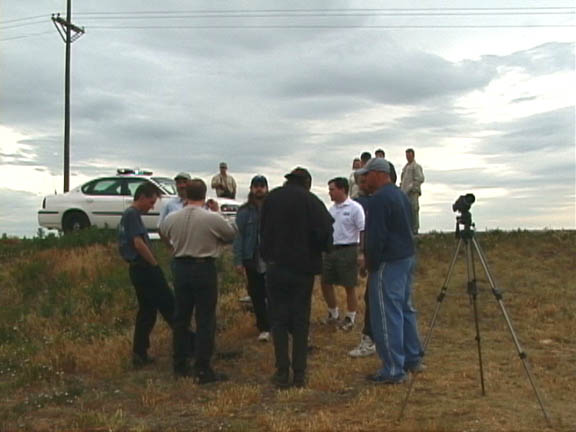Bill Hark
EF5
There are two sides to every story, but it sounds like Jason encountered a police officer who was already having a bad day (maybe his girlfriend dumped him) plus the added stress of a tornado and hordes of chasers. It's up to Jason to decide how to follow up this incident though I would also recommend private contact first before posting on YouTube or contacting media. Unfortunately, this won't be the last incident.
I think there are some measures that can be done to help prevent future incidents with law enforcement. Of course, chasers should behave responsibly, drive safely etc. There's plenty written on proper chaser behavior.
Be Proactive:
Even when not "pulled over", most chasers have had contact with law enforcement. Always be friendly, polite and helpful. Take a few minutes to discuss the forecast, point out radar echoes and show equipment. Ask the officer about nearby road conditions or even their favorite restaurant. Maybe the officer has some interesting stories about previous storms. This establishes the chaser as person, not just one more unnamed tourist speeding through the area. You also show that you value the officer’s opinion. I have found local police to be very helpful. The target area may be a hundred miles away but you or another chaser may encounter the officer or one of his coworkers at a later date.
While Chasing:
In addition to the usual behavior recommendations, be careful when passing law enforcement. If possible, briefly stop to ask if it is all right to pass. You may just have to say that you are aware of the tornado, will drive safely and will report any injuries or damage. If there are four lanes, move over to the center lane when passing a parked emergency vehicle. Many states have laws prohibiting passing a parked emergency vehicle on the adjacent lane.
If pulled over:
I’ve been pulled over multiple times for speeding (not while chasing) and have found that the best policy is politeness. Never argue with the officer. Find out the alleged violation. Be apologetic if you think you are guilty. Observe the situation, name and badge number of the officer or his/her license plate number and make some quick notes when the incident is over. I think running a video or audio tape is very useful. Just don’t tell the officer you are doing it or threaten, “I got you on tape.†The best intelligence is when the other side doesn’t know you have it. Of course, you can always tape over the encounter if it is not favorable.
After an incident:
If an altercation or harassment occurs, first contact the officer’s department and do it as a concerned citizen rather than threatening publicity or lawsuits. I think many incidents can be resolved with a nice discussion, listening to their concerns and appropriate apologies. If not, then bring out the “big guns†with video evidence, going to the media etc.
Bill Hark
Below is a still from the famous encounter with security near a nuclear facility outside of Amarillo. I accidentally left the camera on.

I think there are some measures that can be done to help prevent future incidents with law enforcement. Of course, chasers should behave responsibly, drive safely etc. There's plenty written on proper chaser behavior.
Be Proactive:
Even when not "pulled over", most chasers have had contact with law enforcement. Always be friendly, polite and helpful. Take a few minutes to discuss the forecast, point out radar echoes and show equipment. Ask the officer about nearby road conditions or even their favorite restaurant. Maybe the officer has some interesting stories about previous storms. This establishes the chaser as person, not just one more unnamed tourist speeding through the area. You also show that you value the officer’s opinion. I have found local police to be very helpful. The target area may be a hundred miles away but you or another chaser may encounter the officer or one of his coworkers at a later date.
While Chasing:
In addition to the usual behavior recommendations, be careful when passing law enforcement. If possible, briefly stop to ask if it is all right to pass. You may just have to say that you are aware of the tornado, will drive safely and will report any injuries or damage. If there are four lanes, move over to the center lane when passing a parked emergency vehicle. Many states have laws prohibiting passing a parked emergency vehicle on the adjacent lane.
If pulled over:
I’ve been pulled over multiple times for speeding (not while chasing) and have found that the best policy is politeness. Never argue with the officer. Find out the alleged violation. Be apologetic if you think you are guilty. Observe the situation, name and badge number of the officer or his/her license plate number and make some quick notes when the incident is over. I think running a video or audio tape is very useful. Just don’t tell the officer you are doing it or threaten, “I got you on tape.†The best intelligence is when the other side doesn’t know you have it. Of course, you can always tape over the encounter if it is not favorable.
After an incident:
If an altercation or harassment occurs, first contact the officer’s department and do it as a concerned citizen rather than threatening publicity or lawsuits. I think many incidents can be resolved with a nice discussion, listening to their concerns and appropriate apologies. If not, then bring out the “big guns†with video evidence, going to the media etc.
Bill Hark
Below is a still from the famous encounter with security near a nuclear facility outside of Amarillo. I accidentally left the camera on.

